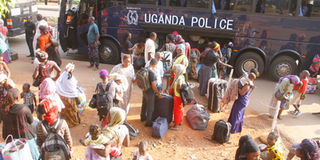Tales of South Sudan returnees

Some of the returnees shortly after arriving Kampala.
What you need to know:
Relatives of Ugandans returning from South Sudan were pleased to be reunited with their loved ones. But the uncertainty of the future probably sits uneasily among the hugs and smiles.
Sights of smiles, dance, hugs and ululations filled the air as scores of relatives received their loved ones evacuated from South Sudan, the uncertainty of loved ones left behind and the future ahead are realities they are struggling to cope with.
One of those is Pamela Alipacu.
Alipacu cheated death when a suspected bomb exploded near her home in Jebele Zone, in Juba, South Sudan. She escaped with serious burns on her right leg and arm. Writhing in pain, Alipacu says she was in her house when a suspected fighter jet dropped a bomb on her village.
As she stares in empty space, lost in thought, Alipacu does not know how to pick up the pieces and move on because “all my earthly possessions” were gutted by the fire. The Nebbi District native believes her three Sudanese friends and a Ugandan perished in the explosion, a thought that torments her and has made her vow never to go back to Juba.
What next?
While Alipacu ponders what to do next, Thereza Awoli wonders whether her husband escaped the skirmishes.
Awoli, who has been operating a restaurant for the last six years in Juba, says her husband was stranded.
“I was at the restaurant when the war broke out. My husband was at his place of work where he works as a cashier. He was trapped, I pray that he is fine,” Awoli says.
For Christine Nakawuki, that was a minor setback and she cannot wait to go back and attend to her retail shop. She says she cannot let her Shs10m to go to waste just like that.
“I have entrusted my business to a friend but I will soon go back.” Asked if she is not scared of the warzone, Nakawuki says she cannot live without her business. Before adding, “What will my child eat?”
Resolve
Prossy Namubiru, who claims to have been operating a Shs7m boutique in Nyakrul zone, Juba, says her business was destroyed a day after the conflict had broken out. She says she learnt about the evacuation from a South Sudanese friend who heard about it on radio. The friend gave her a contact number which she used to get to the meeting point for the evacuation.
Namubiru says not even the profits she was making in Juba will lure her to to the war-torn country.
“I am happy to have survived the brutal hand of death. I am going to concentrate on raising my family,” Namubiru says as she hugs her husband, a boda boda rider in Kampala. Although she is not sure how she will fill the gap of the extra income she was sending to her family, Namubiru seems pretty sure that somehow they will forge a life.
For all these returnees, there is one unifying factor, the uncertainty of the future.
Many people left their home countries to eke out a living in newly independent South Sudan in 2011. The young nation was buzzing with activity as it relied on foreigners for their business and labour force needs.
The pound, their currency, was faring well on the world market, but due to the recurring unrest, the Sudan pound is fast depreciating and for foreigners carrying out business it is becoming harder to maintain business interests there.
Numbers
More than 5,000 Ugandans living in South Sudan were evacuated by the UPDF.
Lt Col Paddy Ankunda, the army spokesperson, said pregnant women, very young children and sick people were evacuated to Gulu by helicopter but the rest were rescued by road.
Not only Ugandans benefited from the evacuation but also nationals from other countries. These included 306 Kenyans, 269 South Sudanese, 14 Burundians, eight Eritreans, four South Koreans, two Britons, two Ethiopians, a Congolese national, one Tanzanian and a Somali.
About South Sudan
South Sudan is the world’s youngest nation that gained her independence from Sudan on July 9, in 2011 after a referendum. It was part of the peace agreement signed to end a 20-year-old civil war.




